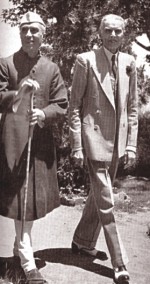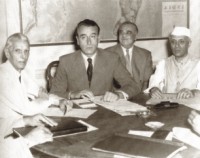| History
Destined to Fail
India's Interim Government (1946-47) Azizul Jalil
“The greatest obstacle to India going forward towards independence was the inability to get started.”
Lord Pethick-Lawrence, Secretary of State for India.
June 1946.
 |
Nehru and Jinnah in Simla, 1946 |
The British cabinet mission visited India in March-May, 1946. It proposed a federal solution before transferring power to the Indians. The Congress and the Muslim League differed in their interpretation of the plan, after both had agreed to it. Though discussions between Indian leaders and the British continued until December 1946 to salvage the mission's scheme, it did not succeed. The short-term plan of the mission provided for the formation of an interim government to carry out the administration of the country leading up to full self-government. It was to be composed of only Indians, except the British viceroy, who would be the president of the council.
On September 2, 1946, the first Indian national, though not independent, government was formed. Lord Wavell, the viceroy of India, at the head of the civil services and the Indian army under British command, wielded sovereign authority over India on behalf of the Crown. Initially, most of the members of the cabinet were Congress stalwarts. The Muslim League, though invited, declined to join because its demand that only it will nominate Muslim members was not accepted. The viceroy, under instructions of Attlee, the British prime minister, went ahead and formed the government with the following Congress representatives: Pandit Jawaharlal Nehru, Rajendra Prasad, Ballavbhai Patel, Chakravarti Rajagopalachari, Asaf Ali, and Jagjivan Ram. Three members of the minority communities (Sikh, Christian and Parsee) were selected by the Viceroy. They were- Baldev Singh, John Mathai and C.H. Bhaba. Nehru became the Vice-President of the interim government and the de-facto prime minister. The Muslim League followed Gandhi's tactic of non-violent protest by asking the Muslims to fly a black flag from their housetops 'in silent contempt for the Hindu Government.'
Following further discussions with Wavell, Jinnah sent a letter to the viceroy on October 13, 1946 expressing a desire to enter the government. He made it clear that the decision was taken because the League felt that it would be a fatal mistake to the interests of the Muslims to leave the entire field of administration in Congress hands on the eve of independence. The League soon joined. It was given five cabinet positions, including Finance, which was filled by Liaquat Ali Khan. Other Muslim league members were: I.I. Chundrigar, Ghaznafar Ali Khan, Sirdar Abdur Rab Nishtar and Joginder Nath Mandol. The last one was from the Hindu Scheduled Caste community and included by the League as a tit for tat to the Congress for having included a Muslim-Asaf Ali, in the council.
Nehru was chosen by Gandhi as his successor. With Harrow and Cambridge education, he possibly considered himself superior to other Indian leaders. He was indeed a very gifted man and had a charming personality. Many
years later, in a relaxed mood he told John Galbraith, the US Ambassador to India: “Well, you know I am the last Englishman to rule in India.” Nehru had a daunting task. The Muslim members in the council were also men of great caliber and experience. From the beginning, Nehru's pre-eminence as vice-president was challenged by them. They also ridiculed the idea of joint cabinet responsibility. Jinnah remarked that, “If Nehru can only come down to earth and think coolly and calmly, he must understand that he is neither the prime minister nor is it a Nehru government.” The coalition ministry was thus doomed from the beginning. The Muslim League members worked as separate block in the council, which became the battleground of the war of succession. One of the League members, Ghaznafar Ali Khan declared that the interim government was one of the fronts of the Muslim League's Direct Action campaign for the achievement of Pakistan.
 |
Nehru and Jinnah with Mountbatten (middle) in Delhi in 1947. |
In the vital finance ministry, Liaquat, educated at Oxford and a Barrister, proved formidable in thwarting Congress members' plans to run the government their way. Every file that went from their ministries was subject to prolonged scrutiny and questioning in the finance ministry. Ministries headed by the Congress were unable to deliver the goods and came virtually to a stand still. The crunch came at the time of the budget of 1947. Liaquat planned to put heavy taxation on those who had business income of more than one lakh of rupees. He also proposed to appoint an Income Tax Investigation Commission to look into the evasion of taxes on profits by businessmen and industrialists. These tax-evaders were mainly the patrons and financiers of the Congress. For the Congress, it became very delicate. It did not want to antagonize its patrons and at the same time could not oppose what seemed morally and fiscally right. Sardar Patel said the proposals were based on communal considerations and were intended to harm the Hindu capitalists. Patel ignored the argument that the proposals were in full conformity with the declared Congress objectives.
The experience of the interim government was bitter for both Nehru and Patel. Nehru lost all hope of joint action after he saw the conduct of the League members. He reportedly passed a few sleepless nights and abhorred the prospect of dealing with them. The council members of the Congress and the League could not see eye to eye on any question and quarreled every day. Patel became so bitter with the Muslim League members inside the cabinet that he was ready to accept partition of India if thereby he could get rid of the League. The fact was that the Congress and Muslim League members were not working to forge the unity of India. On the contrary, they were carrying out the policies of two warring parties about the future shape of India. In the absence of an over-all political settlement and trust among the politicians, nothing better could be expected from the interim government. Sounds familiar?
When Lord Mountbatten replaced Wavell as viceroy in March 1947 with instructions from the British government for quick transfer of power, he found India a completely divided country. All of Mountbatten's charm, diplomacy and stature were of no avail in bringing about an agreement among the Congress and the Muslim League. He then devised a hurried plan for the partition of India. Since1940, Jinnah was demanding partition of India. Mountbatten found that Nehru and Patel by that time were quite willing to go along. In his book 'India Wins Freedom', Maulana Azad wrote: “Lord Mountbatten advised that it would be better to give up a few small pieces in the north-west and north-east and then build up strong consolidated India. Sardar Patel was impressed with the argument that cooperation with the Muslim League would jeopardize Indian unity and strength. …… Jawaharlal asked me in despair what other alternative there was to accepting partition.”
Alan Campbell-Johnson in his book 'Mission with Mountbatten' wrote that Nehru and Patel accepted partition: “on the understanding that by conceding Pakistan to Jinnah they will have no more of him and eliminate his nuisance value, or as Nehru put it privately, that by cutting the head we shall get rid of headache.” In April 1947, Gandhi made one last attempt to prevent partition of India by proposing to Mountbatten that he ask Jinnah to form a new central government, promising to provide all support. Mountbatten never mentioned it to Jinnah. Instead, he reported it to Nehru who summarily rejected the idea. British India was partitioned and India and Pakistan emerged as independent countries in August 1947.
[Note: In addition to Moulana Azad's and Alan Campbell-Johnson's books quoted above, Stanley Wolpert's biographies of Jinnah and Nehru, Wolpert's book “Shameful Flight”, S. K. Majumdar's book “Jinnah and Gandhi” and Hector Bolitho's biography of Jinnah have been consulted]
Azizul Jalil writes from Washington.
Copyright
(R) thedailystar.net 2006 |
